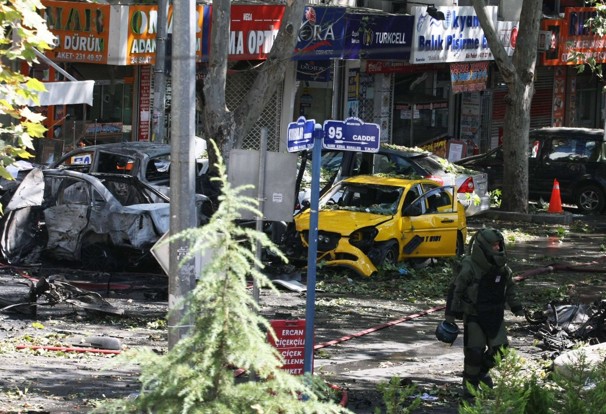
Once again, hearts and prayers go out to a victim of a terrorist assault on a US diplomatic establishment. The February 1 suicide attack on the American embassy in Ankara claimed one wounded, a visiting Turkish journalist, and two dead–embassy security guard Mustafa Akarsu and the bomber himself.
In remarks to the media, Turkish Interior Minister Muammer Güler reported that the perpetrator may have been affiliated with the so-called Turkish Revolutionary People’s Liberation Army/Front–known by its Turkish initials as DHKP/C.
This was no Benghazi. The Ankara embassy’s tight security perimeter did its job, stopping the assailant before he could endanger the US mission and its diplomatic staff and confining the security breach to one of the several reinforced gatehouses that screen visitors into the embassy compound. Embassy staff under Ambassador Francis Ricciardone reacted calmly and efficiently, immediately sealing the compound and securing the people and facilities inside. Ricciardone promptly went outside the embassy fences to make a statement to the media, demonstrating confidence, not confusion, about his post and its security.
As today’s televised images make clear, Turkish policy deployed with great–and customary–speed to ensure security outside the perimeter as well. One can wonder whether the rush of uniformed personnel into the tight street adjacent to the destroyed embassy gatehouse might have made a tempting target for a second bomber, but the bravery and determination were remarkable. I saw something similar while serving as US ambassador in Ankara myself in 2005-2008 when gunshots were fired from the street into my office. Literally within seconds and before most of our own staff knew that anything had happened, dozens of uniformed Turkish security police appeared out of woodwork around the embassy and chased the gunman down.
Another difference from Benghazi: this was apparently not al-Qaeda. The authorities’ presumed culprit, DHKP/C, is a Marxist splinter group with a far out ideology that is anti-American, anti-Western, anti-capitalism, and anti-authority. Its modus operandi has been violent opposition to non-leftist institutions of power whatever they may be, whoever runs them, and regardless of the purposes they serve. Despite its 1960s name and brand, the organization has a history of brutal efficiency in the murder and terrorism business. Over the past two decades or so, it has carried out dozens of assassinations and many more bombings and assaults. Targeting of Americans and American institutions was less effective, but has happened.
For much of the last decade, Turkish authorities seem to have been unusually effective at anticipating and thwarting the group’s moves and plans. According to news reports, security forces obtained information in December about alleged plans for wide-ranging DHKP/C murder and terror attacks in Istanbul, Ankara, Izmir, and elsewhere. By mid-January, a crackdown on the organization was underway. Authorities arrested over fifty activists and detained many more, including lawyers accused of being a kind of legal front for the organization, which is banned in Turkey and on the USState Department’s terrorism list. If the assailant is indeed associated with the DHKP/C, then the attack was likely a retaliation for those arrests.
That the suicide bomber’s target was the United States, home of Patriot air defense missiles recently deployed to Turkey at the request of the government of Prime Minister Recep Tayyip Erdoğan, would for DHPK/C have perhaps been a twofer. A successful attack would embarrass the Turkish government and security forces, and it would have struck at the United States, which is widely–if wrongly–thought to have manipulated the Erdogan government into breaking with Bashar al-Assad and supporting efforts to remove him from power. That might rekindle public support for the group. Alas for DHPK/C, this seems unlikely. Turkey has moved on from the left-right battles and anti-capitalist socialism of the 1970s, ‘80s and ‘90s–and even from the anti-Americanism that spiked after the 2003 invasion of Iraq. It’s got different battles and issues now. More likely, this deeply marginalized group will move further to the margins, if not out of business altogether. That will be good.
Ross Wilson, director of the Dinu Patriciu Eurasia Center at the Atlantic Council, was US ambassador to Turkey from 2005-2008. Photo credit: Reuters.
Image: ankara-embassy-bombing.jpg
